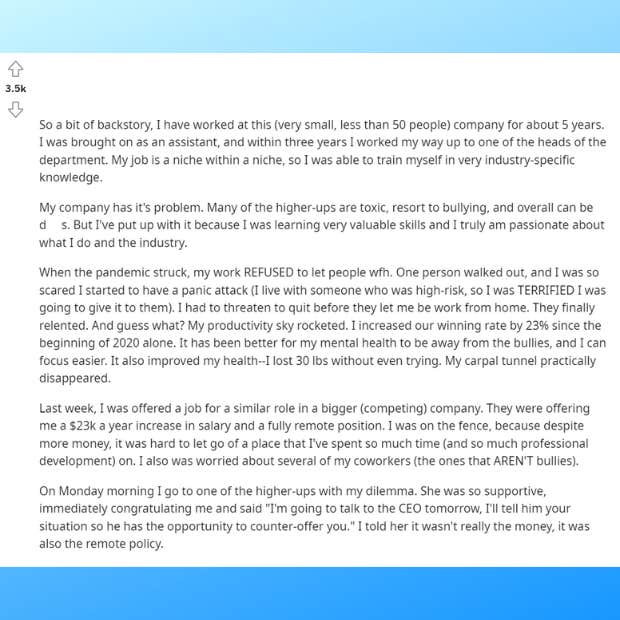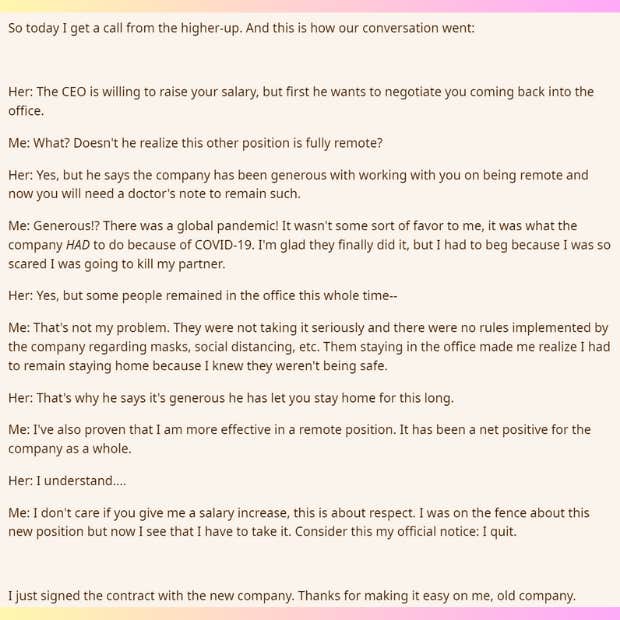Woman's Health Improves After Her Employer Lets Her Work From Home But She 'Rage Quits' When They Demand She Return To The Office
Since working from home, she'd lost weight and her carpal tunnel had almost disappeared.
 Fizkes / Shutterstock
Fizkes / Shutterstock The pandemic made it crystal clear that employees could be more productive by foregoing their commutes and working from the comfort of their homes. People who work from home are 47% more productive and see an average performance increase of 13%.
Eighty percent of remote workers believe that working remotely allows them to take better care of their mental health. That’s exactly why one woman requested that her employer allow her to work from home, and quit her job of five years abruptly when they demanded she return to the office.
She quit her job because they wouldn't allow her to work remotely anymore.
A story initially shared on Reddit's r/antiwork subreddit, then uploaded in a TikTok video to the “RequestedReads” account, was titled “I finally rage quit my job of five years.”
The worker started by saying that she had worked at a small company for five years, working her way up from being an Assistant to a Department Head within her first three years. She did so by training herself on “industry-specific” things.
According to her, leadership at the company is very “toxic” and routinely bullies employees. “I put up with it because I am learning very valuable skills and I truly am passionate about what I do in the industry,” she explained to justify her loyalty over five years.
When the pandemic began, her job refused to let people work from home, resulting in one person walking off the job due to the risk.
The new, in-person requirement gave her anxiety and made her worry about exposing her roommate to the virus because they were high-risk and susceptible to major complications. She threatened to quit as a result, and her employer relented, allowing her to work remotely.
 Photo: Reddit
Photo: Reddit
The woman claimed that after she started working from home, her productivity “skyrocketed” and her mental and physical health improved. “I can focus easier. It also improved my health. I lost thirty pounds without even trying. My carpal tunnel practically disappeared,” she said.
Everything was status quo until she applied for and was offered a job at a competing company that would be completely remote and would pay her $23,000 more than she was making at her current job.
Though the offer sounded good, she was on the fence because she had spent so much time at her job and had developed so much over the years. In addition, she was concerned about her colleagues and what would become of them when she left.
After relaying to her boss that she’d received a job offer, her boss seemed supportive. She was told that her boss would notify the CEO of the opportunity so that he had a chance to give the woman a counter-offer in an effort to keep her at the company. In response, the worker made it clear that the remote policy was more important than the salary increase.
Nevertheless, when she spoke with someone in leadership, they relayed that the CEO was adamant that she return to the office.
“The CEO is willing to change your salary, but first he wants to negotiate you coming back into the office,” she said. After reiterating that the allure of the other position was the ability to work remotely, the upper manager pushed back, saying the CEO had been very generous in allowing the woman to work from home in the first place. She demanded a doctor’s note in order to continue to stay out of the office moving forward.
The woman told the manager that allowing employees to work remotely during the global pandemic was standard and by no means “generous.” “It wasn’t some sort of favor to me. It was what the company had to do because of Covid-19. I’m glad they finally did it. But I had to beg because I was so scared I was going to kill my partner,” she shot back.
 Photo: Reddit
Photo: Reddit
Undeterred by logic, the manager talked about how other people had remained in the office during the pandemic, insinuating that the woman had received special treatment. But the at-risk worker shut that down by saying that the careless employees were the exact reason she wanted to stay away from the office.
They continued to go back and forth about the matter with the manager demanding she return now that the pandemic was over and her touting her increase in productivity since working from home.
The two of them were unable to find common ground and the conversation ended with the worker saying, “This is about respect. I was on the fence about this new position but now I see that I have to take it. Consider this my official notice. I quit.” She went on to sign a contract with the new company and put the “toxic” workplace in her past.
Workers used to be simple and low maintenance. They just wanted a stable job and a good paycheck. But as we have learned more about ourselves and what makes us happy, employees have required employers to be more cognizant of their needs.
People do want to make a good living and utilize great benefits but, in addition, they want greater work-life balance and better overall wellbeing, and that might include working from home. Companies that can retain good workers do so by understanding the entire employee experience and adding value to every aspect of workers’ lives.
Remote work doesn’t necessarily mean better mental health.
It’s easy to assume that working from your own familiar and comfortable setting would result in better mental health and overall wellbeing, and that is true in some cases. But fully remote and hybrid workers have an increased risk of anxiety and depression.
Some other mental stresses for remote workers are burnout, pressure to always be available, a lack of support, increased hours, and isolation.
Every person has their individual needs and should consider them when deciding whether to work in-office or from home. Employers can help their remote employees by creating a culture that includes and engages everyone.
NyRee Ausler is a writer and author from Seattle. She covers issues navigating the workplace using the experience garnered over two decades of working in Human Resources & Diversity, Equity, and Inclusion.

